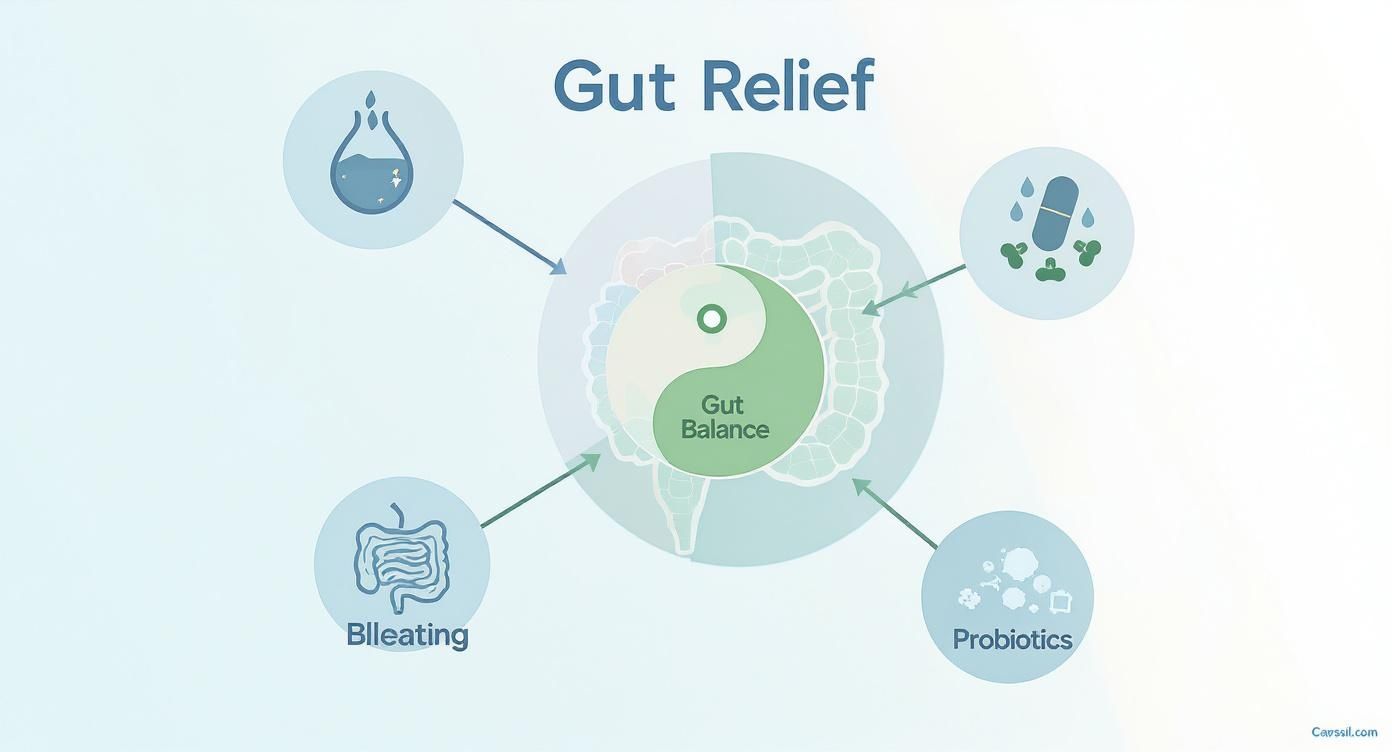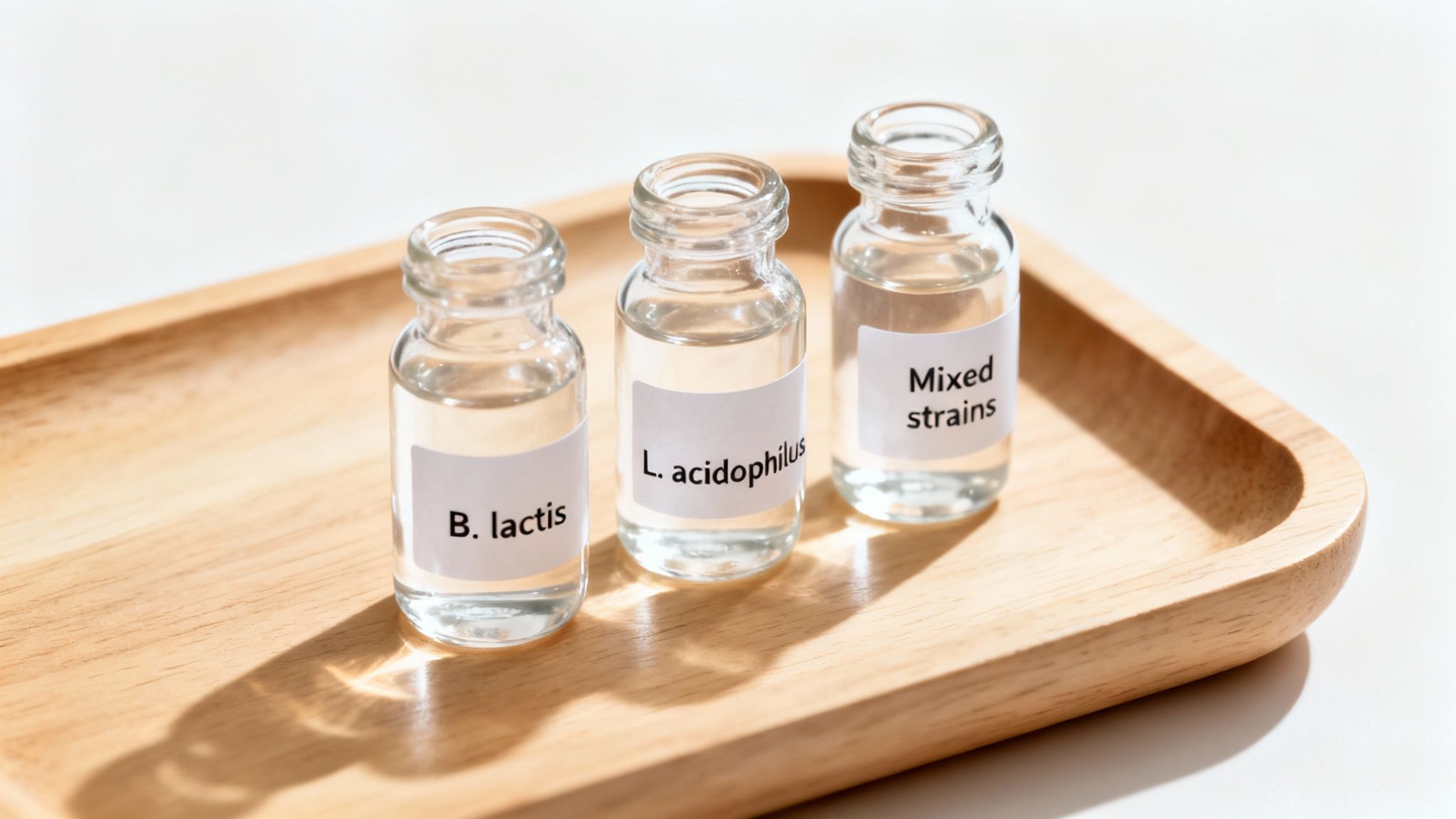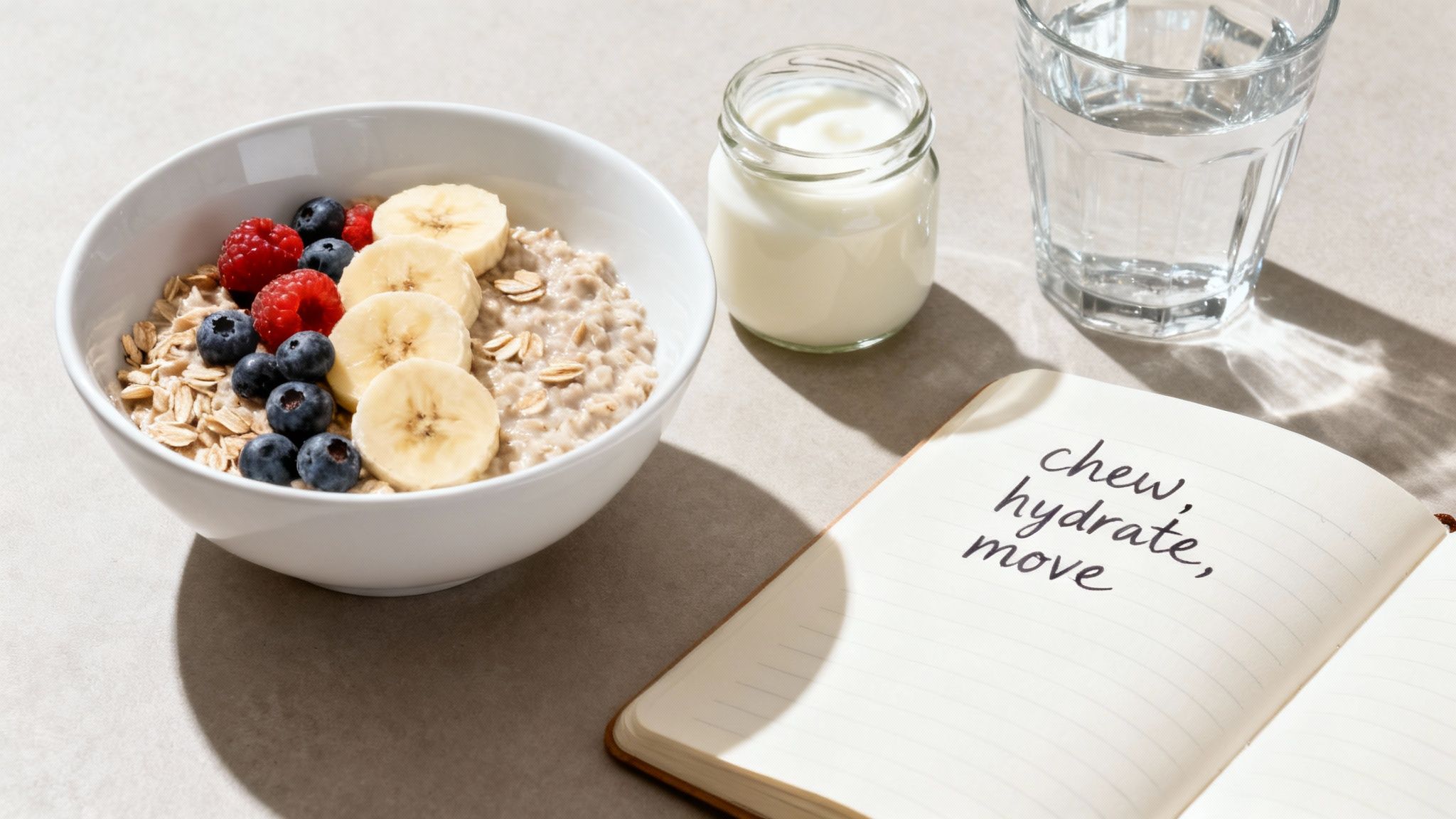Probiotics for Excessive Gas: Your Guide to Lasting Gut Relief
Ever feel like your stomach inflates like a balloon by afternoon? You’re not alone-and it’s not just about what you ate for lunch. That constant, uncomfortable feeling of being full of air is more than just frustrating. It can completely derail your day.
If you’re tired of planning your life around unpredictable gas and bloating, we get it. Seriously. It’s the kind of discomfort that makes you second-guess your outfit choices and can turn a great day into a miserable one. That's why we’re going to move past the temporary fixes and get straight to the root of the problem.
We'll break down exactly how certain probiotics act as your gut's reinforcement, helping to restore harmony and, in turn, reduce gas. You'll learn which strains are scientifically proven to be most effective and how to choose the right supplement to finally find some digestive peace.
For a deeper dive, explore our guide on natural ways to say goodbye to bloating. Consider this your first step toward a calmer, happier gut.
Understanding What's Really Causing Your Gas
Before we can find a lasting solution, we have to get to the root of the problem. And I don’t just mean blaming it on the burrito you had for lunch. Excessive gas is often a sign of a deeper imbalance happening inside your gut. Let's break down the main reasons this happens, in simple terms.
Think of your gut as a bustling garden. To thrive, it needs the right balance of helpful plants (good bacteria) and a few weeds (bad bacteria). But when the weeds start to take over, things get chaotic.
When Your Gut Garden Is Overrun
The most common culprit is something called gut dysbiosis. It sounds complex, but it just means the "bad" bacteria in your digestive system are throwing a party and starting to outnumber the "good" guys. These unhelpful microbes feast on undigested food, and the byproduct of their feast is-dun, dun, dun-unwelcome gas. Yikes!
This process is a bit like leaving fruit out on the counter for too long. It starts to ferment, creating some pretty funky odors. The same thing happens when food hangs around in your digestive tract for too long, a common result of a sluggish gut.
This infographic helps visualize the connection between gut balance, gas, and how probiotics can step in to help.

As you can see, probiotics are a direct way to reinforce your gut's natural balance, which is a key step in getting gas and bloating under control.
To make this even clearer, let's look at some common gas triggers and see exactly how probiotics tackle them.
Common Gas Triggers and How Probiotics Help
| Common Cause of Gas | How It Creates Gas | How Probiotics Can Help |
|---|---|---|
| Bacterial Imbalance (Dysbiosis) | "Bad" microbes ferment undigested food, releasing hydrogen, methane, and other gases. | They introduce "good" bacteria that compete with and crowd out the gas-producing culprits, restoring balance. |
| Poor Digestion of Foods | Foods like beans, lactose, or certain fibers aren't broken down fully, providing fuel for gas-producing bacteria. | Certain probiotic strains produce enzymes that help break down complex carbohydrates and lactose more efficiently. |
| Slow Gut Motility | When food moves too slowly through the intestines, it has more time to ferment and create gas. | Probiotics can help regulate bowel movements, ensuring food waste moves through at a healthier pace. |
This table shows it's not just one thing; probiotics work on multiple fronts to address the underlying issues that lead to uncomfortable gas.
Why Probiotics Are a Game-Changer
This is exactly where introducing targeted probiotics for excessive gas becomes such a powerful strategy. Probiotics are the "good guys" you need to send in to restore order in your gut garden. They help by:
- Crowding out the bad guys: By repopulating your gut with beneficial bacteria, there’s simply less room and fewer resources for the gas-producing microbes to thrive.
- Improving digestion: Certain probiotic strains actually help your body break down food more effectively, so it doesn't have a chance to sit there and ferment.
- Strengthening your gut barrier: A healthy gut lining is crucial for overall digestive comfort and preventing irritants from causing even more trouble.
And the research backs this up. A scientific review found that specific probiotic formulas can significantly reduce flatulence episodes. You can read more about the research on these probiotic findings. What this means for you is that science confirms these tiny helpers can make a real, noticeable difference. By addressing the root cause-the microbial imbalance-you’re not just masking the symptoms. You're actively creating a healthier, calmer internal environment.
The Best Probiotic Strains That Fight Gas

Alright, let's get into the specifics. Walking down the supplement aisle can feel like a pop quiz you didn't study for. With so many bottles promising digestive peace, how do you pick the right one? The key is knowing that not all probiotics are created equal, especially when your mission is to conquer excessive gas.
Think of your gut microbiome as a specialized team you're hiring for a very specific job. You need to recruit the right bacterial specialists for the task of reducing gas. Certain strains are the proven all-stars in this arena, backed by solid research.
When you're scanning a supplement label, these are the names to look for.
The A-Team of Gas-Fighting Probiotics
Here are some of the heavy hitters in the world of gas and bloating relief. Each one brings something unique to the table, but they all work toward the common goal of restoring balance and comfort to your gut.
- Bifidobacterium lactis: This one is a true powerhouse. B. lactis is brilliant at breaking down fiber and other tricky carbs. By digesting them more thoroughly, it leaves fewer scraps for the gas-producing bacteria to feast on. It's like bringing in a super-efficient cleanup crew.
- Lactobacillus acidophilus: This is probably the most famous probiotic, and for good reason. L. acidophilus helps keep your gut environment slightly acidic, which creates a less friendly home for many of the "bad" microbes that produce a lot of gas. It's also a champ at breaking down lactose, the sugar in dairy that’s a notorious gas trigger for many.
- Lactobacillus plantarum: Consider this strain a peacemaker for your gut. It's well-known for its ability to soothe inflammation along the gut lining. Better yet, studies have shown it can specifically dial down bloating and flatulence, making it a go-to for people with IBS.
- Bifidobacterium longum: Another hero of carbohydrate digestion, this strain helps elbow out harmful bacteria. It also ferments fibers in a way that creates beneficial compounds for your gut, rather than just a bunch of excess gas.
Why a Multi-Strain Formula Is Your Best Bet
Relying on a single probiotic strain is like trying to build a house with only a hammer. This is exactly why a well-formulated probiotic blend is so effective.
For instance, while L. acidophilus is busy tackling the gas from that ice cream you had, B. lactis can be working on the broccoli from your dinner. Having probiotics with multiple strains means you've got all your bases covered, helping to manage gas triggered by different foods and microbial imbalances.
Choosing a product that features several of these science-backed strains gives you the best possible shot at making a real, noticeable difference in your digestive comfort. It's not just about adding "good bacteria"-it's about strategically adding the right good bacteria for the job.
Starting Probiotics and What to Expect
Taking that first step with a new probiotic can feel a little uncertain, and it's natural to wonder what comes next. One of the most common concerns we hear is, "Will probiotics actually make my gas worse when I first start?"
It’s a fair question, and the honest answer is: maybe, for a little while. But don't let that discourage you! If you notice a temporary spike in gas or bloating during the first few days, it's often a positive sign. Think of it as the good bacteria arriving and starting a major clean-up job. This initial "settling in" period can stir the pot a bit before things calm down.
Making the Transition Smooth
This adjustment phase is usually very brief, often lasting just a few days to a week. To make the transition as seamless as possible, a few simple strategies can help your body adapt more comfortably.
Here’s how to ease your system into it:
- Start Low and Go Slow: Don't go all-in with the full recommended dose on your first day. Try starting with just half a dose for a few days, then gradually increase to the full amount. This gives your gut microbiome a chance to get acquainted with its new residents without feeling overwhelmed.
- Take It with a Meal: Pairing your probiotic with food provides a helpful buffer. This gives the friendly bacteria a much better shot at surviving the journey to your intestines, which is where they get to work.
- Stay Hydrated: Drinking plenty of water is a cornerstone of good digestive health, and it's especially important when you're introducing new microbes.
Initial side effects like temporary gas are fairly common, but they almost always fade as your gut finds its new, healthier equilibrium. You can find more great info in this article on probiotics for bloating on Medical News Today.
The key is to be patient with your body. A few days of minor adjustment is a small hurdle on the path to lasting relief.
Of course, the big question is how long probiotics take to work. While this initial adjustment is short, most people notice lasting benefits within two to four weeks. Consistency is everything.
Daily Habits for a Calm and Happy Gut

Probiotics can be a game-changer for gas and bloating, but they can't do all the heavy lifting alone. Think of them as the star player on your team-they need a strong supporting cast to really shine. Your daily lifestyle habits are that supporting cast.
It's easy to dismiss the little things, but small, consistent changes can make a massive difference in how your digestive system feels.
Support Your Gut with Mindful Practices
Rushing through meals is a major offender for digestive distress. When you eat in a hurry, you're not just swallowing your food-you're swallowing a lot of extra air. This, combined with not chewing properly, puts your entire digestive system under unnecessary strain.
Here are a few simple tweaks that can have a big impact:
- Chew, Chew, and Chew Some More: Your goal should be to chew each mouthful until it's almost liquid. This simple step starts the digestive process right in your mouth, which takes a huge burden off your stomach.
- Stay Hydrated (But Time it Right): Drinking plenty of water is crucial. However, try to avoid chugging large amounts during your meals, as this can dilute stomach acid and make it less effective.
- Take a Post-Meal Stroll: A gentle walk after eating isn't just a nice way to clear your head; it works wonders for digestion. The movement helps stimulate the gut, keeping things moving along.
Feed Your Good Bacteria
Just like you need food to function, so do your good gut bacteria. Their preferred meal is prebiotics-specific types of fiber that act as fuel for your beneficial microbes.
From the Founder: "I struggled for years with bloating. It wasn't until I paired a high-quality probiotic with daily habits-like chewing my food and eating more prebiotic-rich foods-that I finally found consistent relief. I do NOT think I could have gotten here with just diet alone. The supplements were the key, but the lifestyle changes made them work so much better." - Sam, Yuve Founder
Incorporating prebiotic-rich foods is easier than you think. Things like bananas, onions, garlic, and oats are fantastic sources. Along with probiotics, exploring certain herbs for digestive problems can provide even more complementary support.
Your Action Plan to Beat Gas for Good
Alright, let's put all this theory into practice. We’ve covered the "why" behind the bloat, so now it’s time for the "how"-a simple, straightforward plan to find lasting relief. The goal is to get you feeling better, starting today.
Your Quick-Win Checklist
- Choose a multi-strain probiotic with key players like Lactobacillus acidophilus.
- Be patient. Give your body 2-4 weeks to adjust and rebalance.
- Support your gut with small daily habits like mindful eating and hydration.
- For extra support, consider adding digestive enzymes with tricky meals.
Build Your Gut Health Toolkit
A smart strategy supports your digestion from every angle. This creates a complete system for gut comfort, leaving less room for things to go wrong.
Here’s what that looks like in practice:
-
Start with a Daily Probiotic: A targeted blend is your foundation for long-term balance. Yuve Digest Aid provides key strains like Lactobacillus acidophilus, specifically chosen to restore harmony and crowd out those unwanted gas-producing microbes. Think of this as your daily gut reinforcement.
-
Add Digestive Enzymes with Meals: For extra support right where it counts-especially with larger or more complex meals-digestive enzymes are a smart, proactive step. Yuve Papaya Enzymes help break down food more efficiently from the start, giving gas-producing bacteria far less fuel to work with.
When you combine the right probiotic strains with powerful digestive enzymes, you create a comprehensive defense against gas and bloating. It’s like having both a security team and an efficiency expert working around the clock for your gut.
FAQ: Your Probiotics Questions, Answered
It’s natural to have a few more questions rattling around. We’ve pulled together some of the most common questions to give you the clear answers you need to move forward with confidence.
How Long Until Probiotics Start Working for Gas?
We all wish for an instant fix, but bringing your gut microbiome back into balance is a process. For most of us, it takes about two to four weeks of consistent use to really notice a meaningful reduction in gas and bloating. This gives the new, beneficial bacteria enough time to settle in, multiply, and start making a real difference.
Can Probiotics Make Gas Worse at First?
It might sound counterintuitive, but yes, sometimes they can. Don't panic-this is usually a normal sign that things are happening. This initial shuffle can temporarily stir the pot, leading to a brief increase in gas. Think of it as a little "house cleaning." This adjustment phase almost always settles down within a week or two. A great way to manage this is to start with a lower dose for the first few days.
When Is the Best Time to Take Probiotics?
The most common recommendation is to take your probiotics with a meal that includes some fat. Food provides a protective buffer, shielding the delicate bacteria from your harsh stomach acid and giving them a much better shot at reaching your intestines alive and ready to work. That said, always check the specific instructions on your product's label.
If you want to brush up on the basics, this resource does a great job explaining what prebiotics and probiotics are for gut health, which is foundational knowledge for any gut-health plan.
Ready to create a comprehensive system for gut comfort? Yuve makes it easy. Combine our targeted Digest Aid probiotic with our meal-time hero, Papaya Enzymes, to build a resilient, happy gut. Let us know how your gut-health journey goes in the comments below
